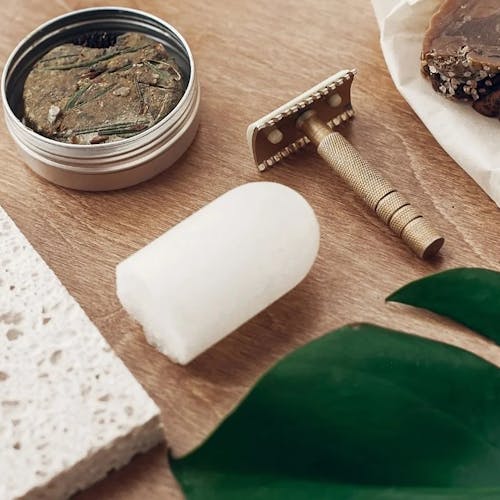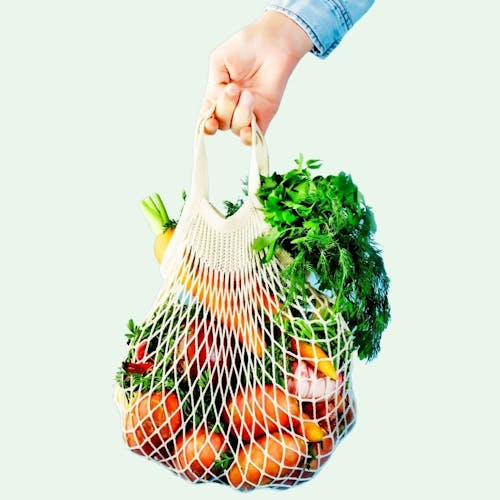This website uses cookies to enhance the user experience. By using Yoppie you are agreeing to our use of cookies.
Microplastics In Cosmetics: Tiny Bits, Huge Problems
Written by Daniella Peri
23 Aug 2021
What are microplastics, and where do they come from?
Are microplastics different from microbeads?
Why are microplastics a problem?
How are tampons and other products contributing to the problem?
What can I do to help?
Humans began mass producing plastic around 60 years ago, and since then we have produced more than 8 billion metric tons of the stuff, only to find out that it’s not all that great for the environment. It’s estimated that only 9% of that plastic has been recycled, with 12% being incinerated, and almost 80% ending up in landfills, or making its way into rivers, oceans, and other natural environments.
Due to its ability to break down into microscopic pieces, plastic may be a problem you can’t even see. We’re diving into all things microplastics, why they’re a big issue when it comes to personal care and cosmetic products, and what you can do to help.
What are microplastics, and where do they come from?
Microplastics are officially defined as pieces of plastic under 5 millimetres, and while a few teeny tiny bits of plastic may not sound very threatening, when millions - even billions - of them end up in our environment they start to cause damage.
“Primary” microplastics come from commercial processes, such as the microfibre shedding from clothing and other textiles, and in cosmetic products when beads of polyethylene plastic are added to products like face scrubs, toothpaste and the like. “Secondary” microplastics come from larger plastic items that have disintegrated into smaller pieces over time. This is often due to environmental factors like the sun and ocean waves.
Are microplastics different from microbeads?
In recent years, we all became more aware of the problems that ‘microbeads’ were causing for our environment, and in 2015, President Barack Obama signed the Microbead-Free Waters Act which banned plastic microbeads in cosmetics and personal care products. The UK followed up with a similar ban in 2018.
While banning microbeads is a step in the right direction, it hasn’t stopped microplastics from wreaking havoc. They even end up in our water systems, with research finding that 99.9% of microplastics are removed from UK drinking water and waste water through treatment processes, taking the average amount from 4.9 microplastics per litre, down to 0.00011 microplastics per litre.
This process is highly effective and protects us from high amounts of microplastics in our drinking water, but it doesn’t stop microplastics making their way into our environment and being ingested by the other creatures who call this planet home.
Why are microplastics a problem?
Microplastics are pieces of plastic that have not yet decomposed, and this could take hundreds, even thousands of years to happen. In the meantime, they damage the environment and can be dangerous to marine life and other animals who consume them.
Some of this is due to littering, but much of it happens due to storms, water runoff, winds, and other environmental factors that carry single-use plastic into the ocean and waterways. As a result, microplastics have been found in everything from giant whales to tiny plankton, as wildlife can accidentally consume microplastics, causing gastrointestinal blockages. These blockages can either cause death directly, or indirectly through starvation.
If it wasn’t shocking enough that microplastics are affecting marine life, they are now being found in our food chain, with recent research discovering that evidence of microplastics has been detected in humans for the first time. A 2017 UN resolution addressed the need for regulations to minimise the impact of microplastics on our oceans, animals, and ourselves.
How are tampons and other products contributing to the problem?
One source of microplastics is undoubtedly the mainstream brands of menstrual products, which come wrapped in plastic, are inserted using plastic applicators, are removed using the plastic strings that hang down, and even have microfibre plastic in their absorbent core.
And pads are usually even worse. Their leak-proof base contains plastic, as do the peel-away stickers, the outer packaging, and the plastic wings that help stick a pad in place. Many big brands have not yet addressed the issue of excessive plastic in their period products, and this is one of the reasons Yoppie exists.
What can I do to help?
Thanks to the ban on microbeads, your bathroom cabinet is already looking a lot more sustainable, but there are things you may want to try out to reduce your plastic impact further. Here are just a few:
- Buy from eco-friendly beauty brands that take their sustainability goals seriously (look out for greenwashing brands that claim sustainability through false promises)
- Invest in more reusables, like reusable makeup remover pads and reusable face cloths, to limit the plastic you are throwing away
- Opt for bamboo toothbrushes, and try out toothpaste tabs instead of buying squeezy plastic tubes
- Get yourself a reusable razor to avoid the plastic throw-away kind, and avoid using plastic cotton buds - try the cardboard ones instead
- Recycle as many of your plastic containers as possible, and find your local refill shop to stock up on packaging-free products
- And of course…switch to eco-friendly period care!
Our tampons, eco pads and ultra-thin liners are all made from 100% organic cotton, with zero plastic, and only recycled cardboard applicators (if you want them; we do "naked" tampons too)! While plastic can take hundreds of years to break down, our biodegradable products are made using raw cotton that usually takes only 6 months to degrade, while our other menstrual care products like our PMS supplements and charcoal sheet face mask come in recyclable packaging. We always aim to make our packaging is planet-friendly; completely plastic-free whenever possible, ethically made, and FSC certified - great menstrual cycle care that doesn’t contribute to the microplastic problem.
Got a question about microplastics, and how you can help minimise their impact on the planet? Let us know over in our private Facebook group or on Insta @itsyoppie. Don't forget that our personalised period box can get full cycle menstrual care (that goes beyond just the bleed) easily and regularly through your letterbox with planet-friendly creds all built in. That's one load off your mind!
Section jump
Back to top
Subscribe To Our Newsletter
YOPPIE





© 2026 Yoppie is a registered trademark of Phlo Technologies Ltd.
Yoppie's supplements are not a substitute for a varied diet and healthy lifestyle and are not intended to diagnose, treat, or cure any disease. If you are pregnant, breastfeeding, have a medical condition or are under medical supervision, please consult with your doctor before taking any of our products.






